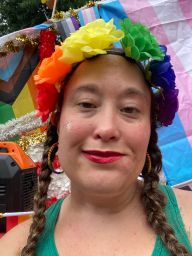The year was 2005. I was 17 years old, a high school senior at a North Carolina public school, and I had just been assigned Jane Eyre as part of my AP English class’s unit on British literature.
It was my first experience with the family Brontë, and it was a matter of a few brief pages to make me fall in love with the story of the reluctant governess’ quest for identity and fulfillment.
I felt a special kinship with Jane: her assertions of gender equality spoke to my budding feminism, her faith in God echoed my own unwavering commitment to a higher power, and her refusal to settle for anything less than true love despite being “small, obscure, plain and little” made my own 4’10” heart soar.
I was, admittedly, predisposed to enjoy Jane Eyre in a way that most of my classmates were not. I had discovered Jane Austen two years earlier, and I was already a convert to the ardent worship of 18th and 19th century women writers. But where I admired Austen’s wit and unapologetic sense of humor, Charlotte Brontë was another revelation entirely: there was force in her words, a conviction that shone through every sentence and illuminated each page with gravitas and dignity. Hers was a true bildungsroman of the sort to which a teenager on the brink of graduation with an uncertain future looming just around the metaphorical bend could cling.
In Jane, I felt I had found a soul-mate: someone who understood the internal conflicts of the everyday; a young woman committed to living a life of meaning and substance, regardless of her humble upbringing. In short, I had found a heroine worthy of my love.
One thing I could not understand about my idol, however, was Jane’s obsession with Mr. Rochester. Despite our unit study of the Byronic hero and my understanding (elementary as it was at the time) of Gothic archetypes, I simply could not accept that Jane -- my Jane -- would fall in love with someone so conniving and cruel.
Never mind his poetic speeches about “inextricably knotted” strings or the fact that the sexual tension in Thornfield Hall could be cut through with a dull butter knife - I hated the idea of Jane giving up her dreams of travel and greatness for a man as selfish and brooding as Edward Fairfax Rochester.
It was contrary to everything I believed in and, while I knew that this was meant to be a romantic tale, deep down I felt sure that Jane was destined for something greater than domestic thralldom. There had to be more for this clever, compassionate, curious creature than spending her adult years tied to the childbed - a fate I could not conceive of for myself (neither then nor now), and which repelled and terrified me.
Imagine my relief when Jane discovers the truth of Rochester’s perfidy and ends up miles away from Thornfield in the home of the Rivers family. Watching Jane become a woman of independent means, the mistress of a school with friends who loved her and an income of her own, was an unlooked for but welcome twist. Here, surely, was a better fate than marriage and a lifetime of risky pregnancies, “love” be damned!
And when St. John proposed? Well, I won’t say that I was impressed by his methods, but what he offered was so clearly what Jane had always desired: the chance to travel, to see the world, to be a part of something bigger than herself. I celebrated the fact that Jane had escaped the chains of domesticity for a better life, full of the things I was starting to realize I wanted for myself.
…but then Jane hears Rochester’s voice calling to her across the dusky moors and, like the lovesick idiot that she is, my misguided heroine ran right back into the arms of her (now) blind and pathetic man-child of a soulmate. Reader, she married him, and I was bereft.
Years (and many readings of the novel) later, I can’t help laughing at my teenage indignation over Jane’s happy ending. Although I didn’t have the language for it at 17, I know now that I was projecting my own adolescent asexuality on a heroine in whom I saw so much of myself. As someone who had never experienced romantic or sexual attraction, it was inconceivable to me that an intelligent young woman like Jane would choose Rochester over the chance for personal and spiritual fulfillment as a missionary to India.
She may not have loved St. John, but what’s love compared to the opportunity to travel and see the world? And who’s to say she might not have fallen in love with him in time? Even if she didn’t, the platonic affection she did feel was, to my mind, more than enough to be getting on with. That she might want, or even need, something more never crossed my mind.
Returning to Jane Eyre as an adult, particularly through the lens of my graduate-level studies of English at the University of North Carolina at Charlotte, my admiration for and understanding of Jane Eyre has been tempered somewhat by the wisdom of time.
While I will always hold her close to my heart as the companion of my teenage years, I can better appreciate her as an entity separate from myself with her own motivations and desires, and while I may not agree with her ultimate choice of marriage to a man I still consider hateful and repulsive (Byronic ideals be damned), I can respect that she knows her own mind. I can be glad for her, in my way, that she finds happiness with her “second self, and best earthly companion.”
I can also better appreciate my misguided sympathy for St. John and begin to challenge the youthful idealism that made me overlook the faults of the sinner for the mantle of holiness that blinded me as a young Christian convert.
At 17, I was a devout believer in the saving power of Jesus Christ. A few years before, I had dragged my parents to church after visiting a friend’s Bible camp, and I was convinced that my worth as a human being was contingent upon the power of my faith and my devotion to the Word. At the time, I was a club leader for our school’s Christian youth group, and I took my role as a faith leader seriously. So, if Rochester in his hedonism repelled me, St. John was my natural choice for a hero and a partner for my beloved Jane.
It wasn’t until my undergraduate days at Elon University that I began to question my devotion to faith and to the institution of religion itself.
While I remained active in a Bible study for all four years of my undergraduate studies, my worldview shifted to make room for my identity as a global citizen, one who wanted very much to be a part of and to make a difference in this diverse world - a world which (I was becoming increasingly aware) included people that my religion told me were anathema.
I made my first gay friends at Elon, raised money for AIDS research, and campaigned for marriage equality. And while I still went to church, something in the exclusive messages I heard from the pulpit began to make me wary until, a few years after graduation, I stopped going to church altogether.
While I still respect the spirit of the message of the New Testament (Jesus, after all, being a man renowned for his love of misfits and acceptance of outsiders regardless of race, creed, or sexuality), I no longer consider myself strictly “Christian,” and the virtues for which I had originally lauded St. John fail to endear him to me as they did when I was a teenager.
Re-reading Jane Eyre in my twenties, I was appalled by St. John’s treatment of Jane as a mere puppet for God’s will -- a will, I found, which benefited only St. John and never Jane. His botched proposal (worse even than the misguided Mr. Collins’ in Austen’s Pride and Prejudice), in which he proudly asserts that Jane must marry him and that love is unnecessary even after Jane insists that she could never marry without true affection, is as disgusting to me now as Rochester’s treatment of Bertha and attempt to lead Jane into a life of sin as his mistress, despite her repeated protestations. Someone really needs to buy these guys a copy of Vindications of the Rights of Woman, am I right?
Knowing what I do now about my own sexual orientation and being comfortable in my Christian-adjacent spiritualism, I can appreciate my initial reading of Jane Eyre for what it really was: an unconscious but valid reaction against society’s insistence on compulsory heterosexuality and a cry for representation in a genre of literature that I had come to love.
I saw so much of myself in Jane, and while it’s hardly fair to wish that Charlotte Brontë had denied her heroine a conventionally happy ending, part of me still wishes that the novel had ended with an independently wealthy Jane on board a ship to lands unseen, single and unfettered, face towards the horizon and the promise of adventure just across the sea.















